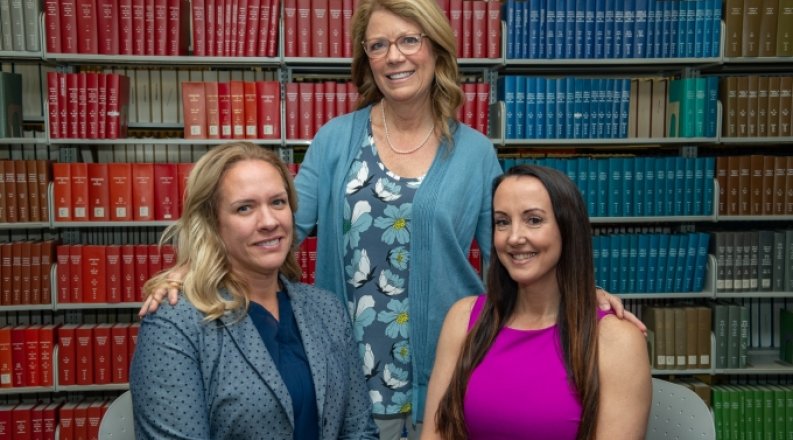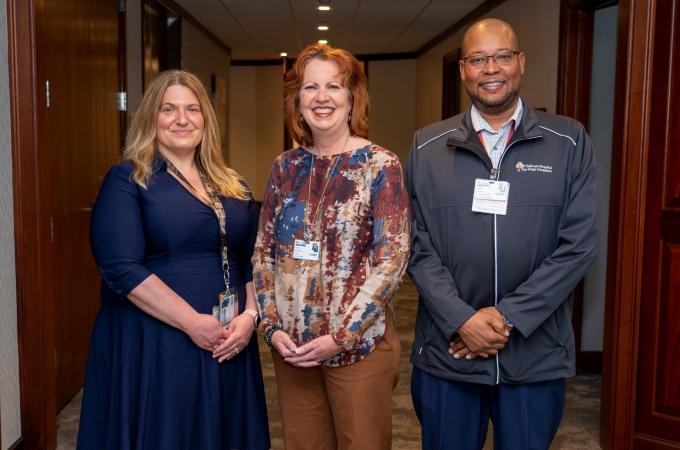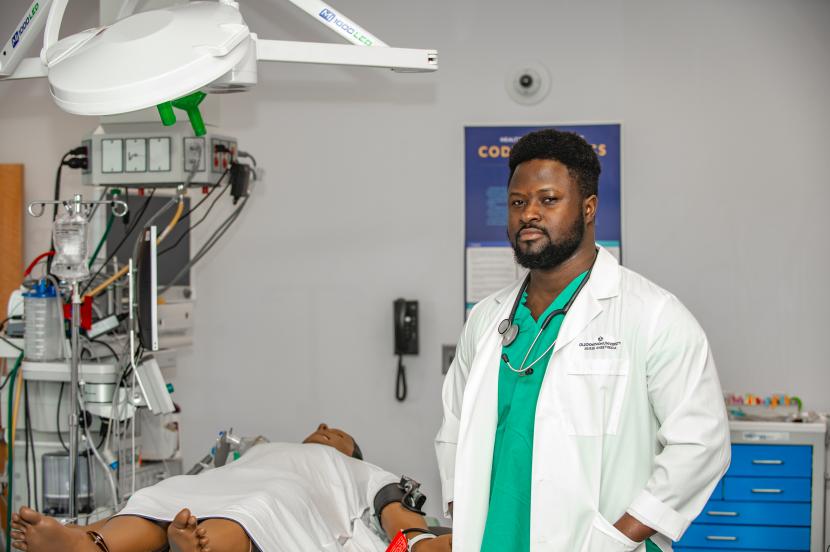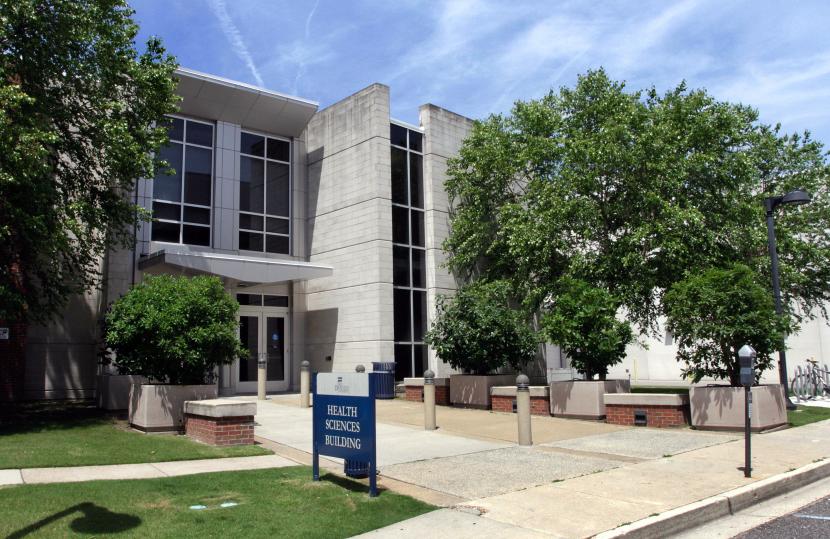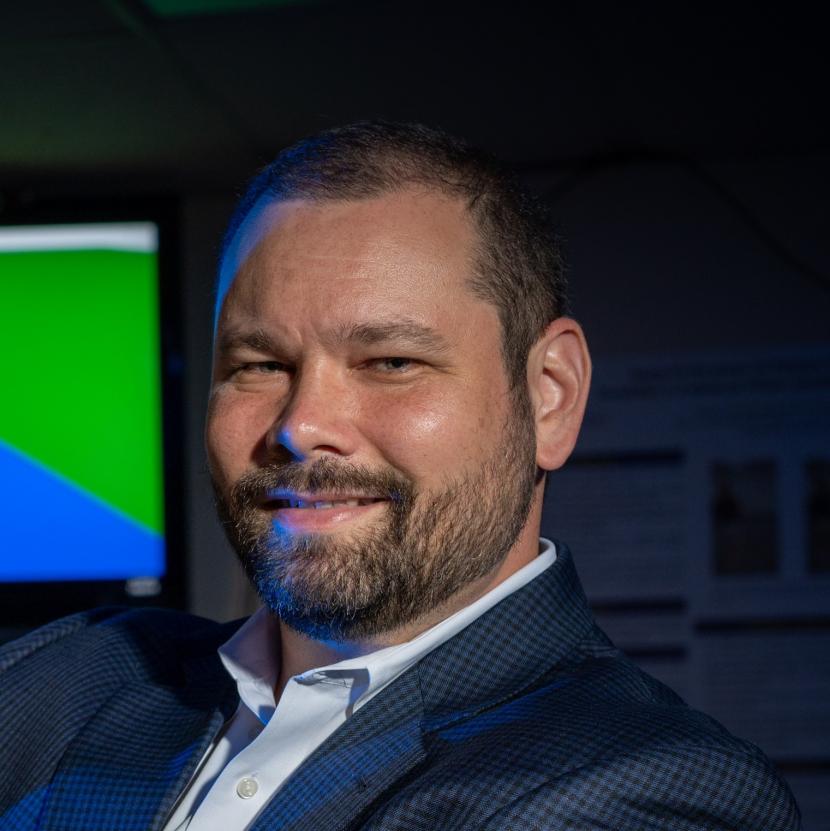From left to right, Brandy Rojas, manager of quality and data analytics for Physician Practice Management at CHKD; Jalana McCasland, vice president of physician practice management at CHKD; Damón Holder, manager of telecommunications and collaboration at CHKD.
When the Omicron variant of COVID-19 swept through Hampton Roads this winter, phone calls flooded pediatric care offices.
Where some may have seen a problem needing a quick fix, Tina Gustin saw an opportunity to build something bigger.
The pediatric nurse, who oversees the Center for Telehealth Innovation and Research (C-TIER) at Old Dominion University, moved quickly to build a beneficial new collaboration. She assembled a team from the University and Children's Hospital of The King's Daughters (CHKD), where she is clinical manager for telehealth. Since November 2021, advanced nursing students at ODU have been manning phone lines for CHKD clinics and urgent care offices, offering qualified advice to parents while gaining critical applied experience in telehealth.
The idea was born after a conversation with Jalana McCasland, vice president of physician practice management at CHKD. McCasland told Gustin that offices and urgent cares were seeing high call volume, with many callers hanging up before a nurse could assist.
"You just couldn't answer them fast enough. It became a math problem - 20 practices in 32 locations," McCasland said. "I needed staff, I needed resources, I needed an innovative solution."
Volume wasn't the only problem. The calls that were completed were time-consuming.
"These calls took longer because COVID is confusing," said Jessica Parrott, assistant professor of nursing in the College of Health Sciences and a pediatric nurse practitioner at CHKD Urgent Care. Because of the fast-changing nature of the disease and frequently updated health care guidelines issued by the Centers for Disease Control and Prevention (CDC), it took time to answer parents' questions and evaluate if a child might need to seek treatment.
Gustin thought students in the School of Nursing's pediatric nurse practitioner (PNP) and doctor of nursing practice (DNP) programs would be ideal candidates to help CHKD. Most have experience as working registered nurses and many are completing their degrees through distance learning. For the PNP students, volunteering would provide real-world experience with telehealth services. For DNP students, the hours could count toward their program requirements.
"Within about 24 hours, we decided to start a call center and see if this helps," she said.
Clearing Hurdles to Collaboration
The collaborators worked quickly to clear the typical hurdles. Because the need was so pressing, there wasn't time for the usual studies or surveys. With the help of CHKD's legal and information technology services teams, a working group began to tackle the long list of tasks - recruiting students, establishing protocols, supplying the necessary legal advice and technology, and more.
"It was a huge organizational lift," McCasland said. "It included a lot of people who at any point could have said, 'We can't do that.' We proved that where there's an urgent community need, people will find a way."
Gustin and Parrott recruited 34 students and faculty to cover 66 hours seven days a week. They worked with Brandy Rojas, manager of quality and data analytics for Physician Practice Management at CHKD, to examine staffing, call volume, the rate of abandoned calls, average hold time and whether calls were all COVID-related. Rojas ensured each student had the equipment and software access they needed to start taking calls.
Gustin and Parrott needed a student to corral volunteers and found a perfect mix of experience and skills in Erin Topalian, a DNP student who is also completing her master's degree in the psychiatric mental health nurse practitioner program.
Topalian, a former civil engineer who transitioned to nursing in 2013, previously worked at CHKD and had unique insight as a student and as a former employee. She's also a military wife who knows what it takes to mobilize quickly; her family once moved four times in one year. She scheduled shifts and assisted with training development as they created and adapted protocols.
Teaching Leadership While Helping Patients
A few weeks before the holidays, the students tried a soft launch of the collaboration. Callers heard a prompt directing COVID-related questions to the help line, where they talked to DNP students who helped evaluate their child's symptoms.
Since November, DNP students at ODU have answered more than 800 calls, and 97% of the callers were triaged and documented without having to transfer to a clinic to make an appointment. After the initial trial, McCasland and Rojas began receiving requests from more practices.
"This helped tremendously for staff so they could focus on the patients who needed to see their physician," Rojas said.
For the students, the partnership built confidence, both with communication and technology. "For those who were not comfortable and hadn't really done telehealth, it's been really helpful," Parrott said. "This is experiential learning immersion that's going to help them grow. They will become excellent hires."
Students pursuing DNP degrees, like Topalian, need to get insight into health care leadership and administration as part of their studies. The project gave her all that and more; she's focused her research on the collaboration, and in April, won third place for her poster presentation at the Mid-Atlantic Telehealth Research Center summit.
This project, and studying for her DNP degree, "has taught me the type of leader I want to be," Topalian said. "We talk a lot about what our legacy in life and our career will be, and I think through this program and the call center, I've learned a lot about managing people and being empathetic, flexible and having expectations and following through. I think it's probably the best thing that could have ever happened to me and the DNP program."
Now, the team is considering ways the partnership could address some of the region's most challenging health inequities, particularly pediatric asthma, mental health and obesity. They're discussing building a telehealth curriculum around ODU nursing students conducting calls to families of children who have been treated for asthma to ensure they're managing treatment and scheduling follow-up visits. Preventative outreach could decrease the likelihood of being readmitted to the hospital.
"The opportunities for partnership are wide and deep," McCasland said. "We proved it could be done. That's the secret sauce. Now what else can we do?"
Related News Stories
Class of 2022: David Moffor Aims to Diversify Nurse Anesthesiology
The Cameroon native hopes to improve outcomes for minority patients as an independent nurse anesthetist practitioner. (More)
ODU, EVMS and NSU Receive $3 Million in Grants from Sentara Healthcare to Tackle Disparities
These collaborative grants are part of the $50 million investment from the Sentara Healthier Communities Fund to address health disparities in maternal and behavioral health. (More)
College of Health Sciences Appoints Christopher Rhea as First Associate Dean for Health Sciences
In the new role, Rhea will be responsible for increasing sponsored research. (More)



